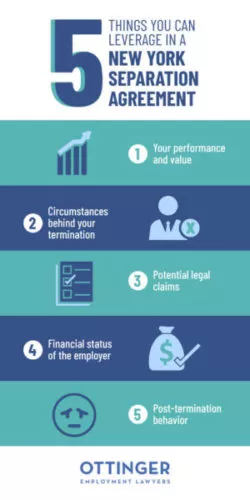

Are you considering a New York separation agreement? You are not alone.
Executives are often provided with separation agreements when their employment terminates. But most people are not sure how to handle them.
We review your severance agreement and then meet with you over the phone to go over it.
It’s a great way to quickly assess your separation agreement. You can schedule your review & consultation by contacting us today.
However, if it interests you to learn more about severance agreements, then this guide is a great start.
New York Separation Agreement hideA New York separation agreement, also commonly referred to as a severance agreement or package is a contract between an employer and employee that dictates the terms of an employee’s separation from the organization.
The separation agreement contains a number of provisions, such as the amount of severance pay, the official date of termination, and any obligations or restrictions on the employee. Restrictions may include waiving rights to file a lawsuit or non-compete and non-solicitation provisions.
Employees are not legally entitled to severance pay or a separation agreement unless stated in a contract, such as a collective bargaining agreement or employment contract.
Top-level employees and executives are the most common recipients of separation agreements. But, separation agreements are also common in situations where employees are terminated for reasons beyond their control.
An employer is less likely to offer a separation agreement to an employee terminated for poor performance or misconduct.
On its face, the idea of severance pay may seem like a kind gesture, but it may not be as genuine as you think. Separation agreements not only give you money or benefits. But they also take things from you as well.
Employers use separation agreements to protect their own interests. For instance, separation agreements often protect confidential information or trade secrets.
Make sure you take your time to consider the agreement before signing it. Don’t feel pressured to sign the separation agreement at the office. Take it home and review it carefully and consider getting legal advice.
Ottinger Employment Lawyers offers a review & consultation which is a quick and affordable way to get a legal opinion about your separation agreement.
Note: An employer may also offer a NY separation agreement as a means to get you to leave quietly, waive your right to sue, or prohibit you from speaking ill about them.
Separation agreements may be offered out of fairness or because they are a customary practice within an organization.

The following terms are common in New York separation/severance agreements:
Whether or not you can, or should, negotiate the terms of your New York separation agreement depends on whether you have any leverage. Consider the following when assessing your negotiating power:
You can always ask for more money. If your company uses a formula to determine severance pay, use the formula amount as a starting point for negotiations. Also, get creative and do not limit yourself to only negotiating severance payments. Consider bonuses, deferred New York Separation Agreement compensation, and any other money owed. The agreement should include all payment deadlines.
The New York separation agreement should cover your right to exercise stock options and, if necessary, ask for an extension of the 90-day period. If you have unvested stocks or options, ask your organization to accelerate the vesting date so they vest before you leave.
If health insurance is not provided for in the agreement, you can continue coverage through the Consolidated Omnibus Budget Reconciliation Act of 1985 (COBRA). Under this federal law, companies with at least 20 employees must offer health insurance to terminated employees for 18 months at their corporate rate. However, the price the employee must pay is the full cost the employer paid, which can be expensive. For example, if your employer paid $600 per month for your benefits, you would pay the same price of $600 per month for 18 months. Due to the significant cost of health insurance, you may want to negotiate extended health benefits or ask your employer to make your COBRA payments. Depending on the health status of your family, payments for benefits may be as important as the severance payment amount.
If you do not need these services, ask for the cash value or have the money allotted to something else like health insurance.
What your employer says about you after you leave is very important. Negotiate terms in the New York separation agreement that clearly dictate what your employer will say about you when contacted by any future employers. Have the employer draft a reference letter and attach it to the separation agreement if possible.
Is there equipment you used on the job, which you would like to keep? If so, ask to keep or buy equipment at a reduced price (e.g., phones, computers).
Did your employer cover any student or auto loans that need to be addressed? For instance, employees are usually required to work for a period of time after completing employer-sponsored education, so look to minimize any paybacks you may be responsible for.
Simply implying it was your choice to resign leaves a lot to the imagination, so agree on an exit message. For example, maybe your employer admits to your strengths in a certain area, but there is little room for advancement due to the size of the company, therefore you had to move on.
When negotiating, start with your biggest requests first such as increasing the severance pay amount or health benefits.
If you start negotiations with a number of small requests like job references, by the time you get to requests that are more significant, your employer may feel they have already bent over backward and be less likely to accommodate your requests.
In addition, if the New York separation agreement contains things you do not want or need, use them to obtain things you do want.
Lastly, if you have concerns about how to approach negotiations or want someone to negotiate on your behalf, contact a New York separation agreement lawyer to assist in reviewing your separation agreement and developing a plan for negotiations.
Before signing the agreement, consider these additional questions and tips:
Speak with a tax professional to understand the tax consequences of severance payments.
Final Thoughts: Losing your job is never easy, but it is critical that you remain professional and keep emotions in check while negotiating a separation agreement.
Unprofessionalism can endanger negotiations and, if you remain in the same industry, can jeopardize future work and your reputation. You never know who you will run into on your next project with a future employer.
Ottinger Employment Lawyers offers a New York separation agreement review and consultation. It’s a great way to quickly get legal help with your New York separation agreement. We review your separation agreement and then meet with you in person, or over the phone, to go through your agreement.
We point out potential problems and suggest improvements. It takes less than an hour and you will know your options and have a clear step-by-step plan.
A review & consultation is a flat fee of $750.
If it looks like there is an opportunity to improve the terms of your separation agreement, we can contact your employer and negotiate on your behalf, or coach you in the background so you can do the negotiating.
Contact us to set up a review & consultation.
Where You Can Find Our New York Office Location